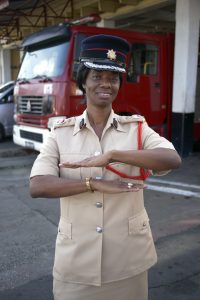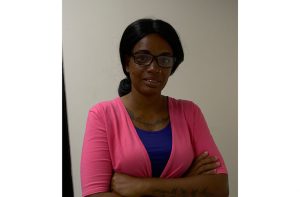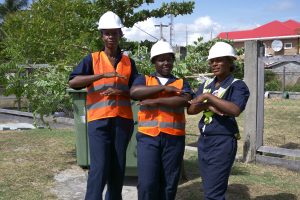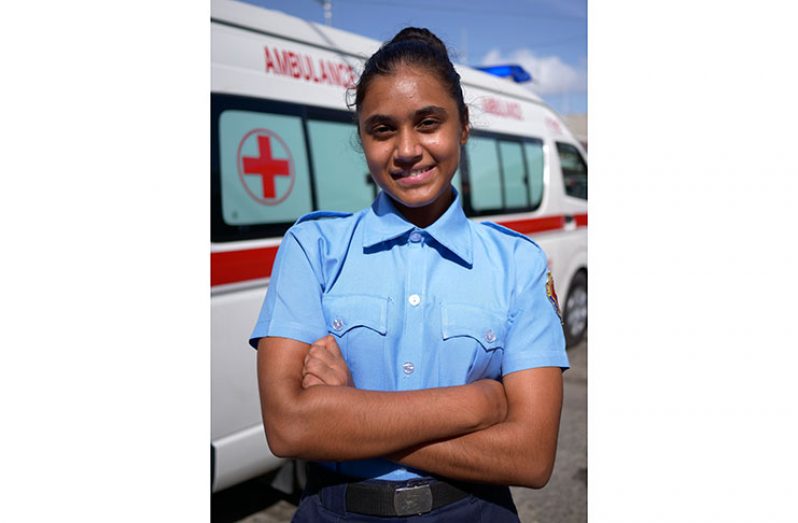
EVERY person, both men and women, can make contributions on the road to gender equality. In fact, we all have a duty to challenge and dismantle the archaic stereotypes that allow for the growth, development, and success of one gender at the expense of the other.
Guyana’s women are making bold strides to level the societal playing field. This edition of Government in Action, in honour of International Women’s Day, observed globally on March 8th each year, features the stories of Guyanese women redefining womanhood as broad, modern, powerful, and equal.
The women of C.O.R.E
The Ministry of Public Infrastructure (MoPI) has mobilised women from communities across Guyana through a programme called the Community Organised for the Restoration of the Environment (C.O.R.E). These women have broken stereotypes by taking on jobs such as the restoration and maintenance of community grounds, trenches, and parapets, which are still considered ‘men’s work.’ While they often receive negative comments that reflect the stigma surrounding their jobs, the women have actually described their work as a very empowering experience.
Ms Karen McLean, mother of four: “I am a single mother of four kids. I am presently employed by C.O.R.E… We go to school or wherever the ministry requires us to go and we do basic stuff, like cleaning of drains, cleaning the fence… There are times we go out and we clean pensioners’ yards. If somebody in the community requests [that we] do something, we also assist them in that area… Being a woman is not an easy road. There are lots of challenges, [in] relationships, [in] finances. Every area [has] challenges. Some are easy to get over; some are not… I’ve faced a lot of challenges in relationships, on the job, at home… But I just live each day as it is and I strive… to perfect the day before. What I fail to do the day before, I try to do it the next day.”

Ms Nalishia Holder, mother of three: “I am the beautiful Ms Nalishia Holder, a single mother with three kids. [I’ve been] working with the C.O.R.E for four years… A woman is [one of] the most beautiful people God put on this earth, beautiful, sexy, loving, caring, [a] wonderful thing God has made… I’m a… strong Black woman. [I] can do anything for my kids. [I can do] any work to make ends [meet and I] try my best to become whoever I want to be…”
Ms Asante Ries, mother of two: “I’m 42, a mother of two… Women are strong, independent, go-getters. Despite frequent comments from those who look down on their work, these ladies continue to see this opportunity as a means of self-empowerment.”
Ms McLean: At times, people do look down on you… Sometimes we would clean trenches and by the roadside… Some people will pass and make funny remarks, but for me, I’m proud of it because I like my work. I love my job. And that has empowered me as a woman. I [am] able to provide for my kids, give them things that I’ve never been able to give them before… When I put on my uniform for work… I [wear] a helmet because that’s part of our uniform-a helmet and overalls. So, the general outfit for the job is like a man’s outfit, but I’m a woman and I’m wearing it. So, I’m happy.”

Ms. Ries: They seem to think that because we’re women we should not be doing [this job]. People would be saying things to you on the road and things like that. They seem to think that only a man should do it. And I want to know why is it that only a man should do it? I don’t understand that… I [think] they feel threatened… because we no longer have to depend on them to bring something and give us. We go for it no matter what… Because of this job, I have a roof over my head. I’m providing. It might not be the best life, but we have a life. We have food in the belly, electricity on the TV that they’re watching. So, why must I be ashamed”?
Ms. Holder: I’m a single parent, a mom and [because] I’m working for my own money, I am a boss. I will not sit there and take any nonsense or any [stupidity]. I am not here to fetch [anybody’s] burden, no one, but myself and my three kids.”
The C.O.R.E. ladies, while offering advice to the women of Guyana, said that it takes, strength, self-confidence, and resilience for women to be self-sufficient. These values, they said, should be passed down to their daughters and the next generation of women.
Ms Ries: I make sure [my daughter] goes to school every day because I explained to [ her that] it’s better to have your own as a woman and you don’t have to depend on anybody … So I teach her to be independent. I let her do things like choose her own clothes, but [nothing] too [crazy]… Freedom of speech, to say exactly what is on her mind. Sometimes it doesn’t come out right, but… I would correct her and say, you know what, that wasn’t the way to say it, but I understand what you were trying to say… [Women] stay strong. Keep your head high. No matter what anybody says, keep going.
Ms McLean: As women, we shouldn’t look down on ourselves. I used to do it [and I’d] think [to] myself that I can’t do certain things and I’m not privy to certain ways of life, but that’s not a good mentality, as a woman, to go about with. We should always place ourselves up there, treat ourselves well as women. Don’t look down on yourself. Don’t let anybody tell you you’re not good enough.”
Ms Holder: As the President has [said] if I’m capable of plaiting hair, let my hands pay me. I cannot depend on the President to find a job, come and say, ‘oh Ms. Holder, I have a job for you. Sew your clothes, get your shoes and you can work at the President’s Office.’ No way! You have to get up, go, and get [it]. Some may [have] education, some may [not]. If you know how to plait hair, let your hands pay you. You can plait hair and get paid. So, I encourage women to get up and go. Don’t sit! You have to get up and go… Giving up is never an option. Never! No way! Women may fall, but you can get up, go on your knees, breathe in, breathe out and go. A woman can make it on [her] own. One hand can’t clap. I know that for sure and real.
The women of the Guyana Fire Service
Deputy Chief Fire Officer at the Guyana Fire Service (GFS), Ms Jacqueline Greene, has shattered several glass ceilings during her 34-year career and she has achieved several firsts as a woman in a male-dominated field. Having paved the way, herself, she is now training up young female recruits to do the same.
Ms Jacqueline Greene: “[I’m] the first female to have attained such a position in Guyana and [in] the Commonwealth. I am the mother of an 11-year-old son. I’m a daughter, the last of six children, six girls. I’d say I’m a humble person… I joined [the GFS] and moved through the ranks until I’ve now attained this position, which, for me, is an honour. To have come this far in a male-dominated organisation, to be a female in this position is an honour and a privilege.”
“Ms Padmini Lakhram, Emergency Medical Technician (EMT): “I’m an Emergency Medical Technician working here at the Guyana Fire Service for a year now. I really love helping people. It’s a passion. I’m very outgoing but shy at the same time. You can say I’m an introverted extrovert.”
Deputy Chief Fire Officer and EMT Lakhram defined womanhood very differently: one emphasises maturity and the other authenticity. However, although at every different stage of life and career, they both agree that a significant part of womanhood is learning to overcome hardships.
Deputy Chief Fire Officer: “Womanhood I think, is not just necessarily being female, but womanhood is that maturity, knowing that you have that sense of maturity to have been able to grow, to overcome issues, to understand that you’re at a different level, different point [that encompasses] all the things that come with it, motherhood, being a daughter, a wife. Womanhood, I think it encompasses all of these things. You strive to do all of these things. You have… a multiplicity of tasks that you have to try to master as a woman.”
EMT Lakhram: “Womanhood is just being a woman, doing your own thing in whatever way you want to, expressing yourself however you want to without considering the fact that you might be judged for it. It’s basically doing you, when everyone is telling you to not be you.
While the deputy chief fire officer has spent her entire career overcoming barriers and gender biases to excel, EMT Lakhram is learning to do the same by knowing her own worth and ability and focusing on the task at hand.
Deputy Chief Fire Officer: “At the beginning, we were never allowed to go out in the fields like these women now have the privilege of doing. We had to remain in the control room or in the offices… So, there were times when I, after having done my stint in the control room… I used to be sitting outside with the males trying to understand what they did. There were times when I just got away. I got on the fire appliances, sometimes after hours when the officers were not there… Two of my training officers [gave] me that support, but afterwards there were men who sometimes [thought] you would not make it, seeing you as a female… But I have been able to work with men side-by-side doing everything that they did.”
EMT Lakhram: “If we listen to [stereotypical thinking], we might not be able to achieve the things that we want to achieve… If you want to go higher places or, at least, [have] equal [opportunities] you must stay focused and do what you have to do. You must not listen to the way they might bring you down and tell you… you don’t deserve this job [because] this is a man’s job. You just show them that you can be a ‘man’ also, but with female parts… It’s really great, picking up patients, managing them before they reach to the hospital, giving them pre-hospital care. It’s really great [for us] because if the patient is critical and we take them to the hospital and they [survive,] it’s like… wow! I helped with this”!
Going forward, Deputy Chief Fire Officer Greene and EMT Lakhram both hope that women across Guyana will learn to believe in themselves and be true to themselves.
Deputy Chief Fire Officer: “The first thing they have to do is know themselves, have high self-esteem. Do not look for gifts from the male counterparts. Let them know that you can do it. Once you get into a male-dominated organisation… you know that sometimes from time to time they may come and say stuff to you. You have to got to be able to stand up to them. If somebody says something to you that you do not like, let it be known… Stand up for what you believe in. And if at any point you have to say no to anybody, no must mean no. And they must be able to look at you and know that you’re saying no and that you mean no… Women, I think they have strong will. We have strong will. And once we put our minds to something we can get it done… you don’t need to be afraid and say… you can’t do it. Tell yourself, “I can do this once I make the effort. I can do it.” That determination, once you have it, you can do anything.
EMT Lakhram: I would just like to say happy International Women’s Day. We, as women, should support each other and not speak of support and then go and do the exact opposite. We should speak of it and mean it.
Superwoman
As a mother, full-time university student, and full-time employee, Ms Jessica Corlette has a lot on her plate. While the responsibilities are mounting, Ms Corlette draws encouragement and drive from her children whom, she says, have helped her become the ‘super mom’ she is today.
“I am currently employed with the Ministry of the Presidency. I’m also a full-time student at the University of Guyana and a mother of two beautiful children… How I view a woman is like a superhero, like the real definition of a superhero. We as women, we juggle everyday life 100 per cent. We take care of our children. We go to school. We do work. We go home. We provide for our families and we do that without complaining much… I view womanhood in a spectacular light, one that enables me… and other women out there to be something more than just a regular person,” she said.
Ms Corlette’s decision to attend the University of Guyana full time while pursuing her career and taking care of her children was met with much criticism from those who thought that it was, perhaps, too much too soon. Rather than see her motherhood as a burden or hindrance, her children became a major source of encouragement for her success.
“The main challenge I face is time, spending time, extra time with my children… I mean, they too have school, which means they have homework. I also have homework. And that would be the main challenge I’m facing, seeing that we’re going home very late at nights… Second, would be the fact that you’re always tired… I see [my children] as my [encouragers]. They are my encouragement to go forward. I look at myself and say… I’m not going to be the one to quit on anything. I’m going to go forward. I’m going to do great, so that my daughter would look at me and saw [sic] a woman can go forward… Children are not a burden, they are my blessings. I look forward to going home to them every day. I look forward to entertaining them and telling them about my day… They see how I study. So, hopefully they’re motivated to go forward and study like I do and try to make better of themselves,” she said.
Ms Corlette said many women feel guilty for pursuing their passions whole-heartedly, because that pursuit can sometimes be seen as a distraction from the more traditional hallmarks of womanhood, marriage and motherhood. Ms Corlette said the best thing women can do is pursue their passions to honour the women trailblazers, who have opened doors for future generations.
“Women are not aware of… their privileges… We are freely going to school. We are participating in sports and other activities. These things were not done in the past… We can acknowledge the past, strong women [who] paved the way for our future and our future generations. I don’t know what the future holds for my daughter as yet, but what I wish for her is that she seizes opportunity… goes after what she wants and she acts on it. I think many women today are not cognisant of the fact that it wasn’t an option for us back then,” she said.
Ms Corlette added that “[Women] should just do what pleases [them]. If you want to be a career woman, you go ahead and you do that. Don’t let anyone deter you from that. Don’t let them tell you that… you should stop now and have children. Or if you accidentally get pregnant… It’s not the end of the road. You will find out that these children are not burdensome. They are your blessings. They will motivate you to go beyond what you would expect for yourself… I don’t think you should take any shameful comments or negative comments from anybody. You just do you and be yourself and move forward,” Ms Corlette said.
This year, International Women’s Day will be observed under the theme, ‘Each for equal, an equal world is an enabled world.’ On social media, the hashtag #EachForEqual will be used to raise awareness, challenge stereotypes, fight bias, and improve the situations of women around the globe. The Government of Guyana will continue to support Guyanese women by nurturing a society that is inclusive and progressive with true gender equality.



.jpg)











